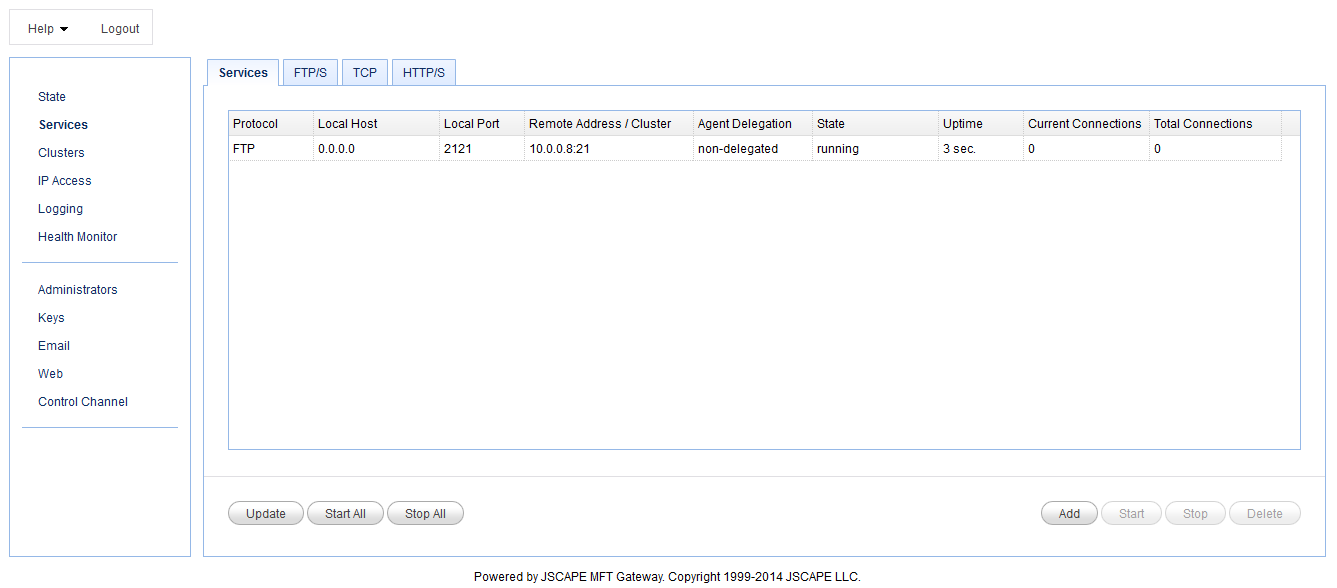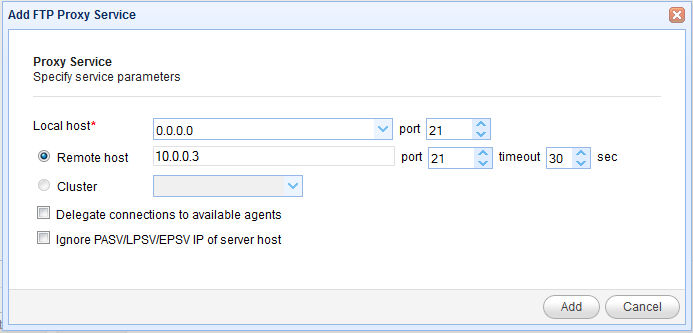A reverse proxy service is an IP/Host, Port and Protocol combination that accepts client FTP/S, TCP (e.g. SFTP) or HTTP/S connection requests. To view existing reverse proxy services click on the Services node. A list of services are displayed.
Figure 2

Protocol - The protocol used. See Protocol types.
Local Host - The local IP that connections are accepted on.
Local Port - The local port that connections are accepted on.
Remote Address / Cluster - The remote host:port or cluster that connections are forwarded to.
Agent Delegation - Indicates whether connections are delegated to listening agents or handled by gateway directly.
State - The state of service (running, stopped).
Uptime - The total uptime since service start.
Current Connections - The current number of active connections.
Total Connections - The total number of connections since service start.
Protocol types
FTP - Forwards standard unencrypted FTP connections.
FTPS - Forwards both standard unencrypted FTP connections and encrypted explicit SSL connections using AUTH TLS or AUTH SSL client commands.
Implicit FTPS - Forwards only encrypted implicit SSL connections.
HTTP - Forwards HTTP connections to target HTTP service.
HTTPS - Forwards HTTPS connections to target HTTPS service.
HTTPS/HTTP - Forwards HTTPS connections to target HTTP service
IMAP4 - Forwards plain IMAP4 connections.
SFTP/SSH - Forwards SFTP/SSH connections.
SMTP - Forwards plain SMTP connections.
MySQL - Forwards plain MySQL connections.
POP3 - Forwards plain POP3 connections.
TCP - Forwards connections without any protocol translation performed (Read and Write).
TCP/SSL - Forwards SSL encrypted connections without any protocol translation performed (Read and Write).
UDP - Forwards connections without any protocol translation performed (Read and Write).
Add service
Figure 3

Protocol - The protocol used. See Protocol types.
Local host - The local IP that connections are accepted on.
Local port - The local port that connections are accepted on.
Remote host - The remote host/IP that connections are forwarded to.
Remote port - The remote port that connections are forwarded to.
Cluster - The cluster to forward connections to. This is used for load balancing purposes.
Delegate connections to available agents - If checked then connections will be handled by connected agents rather than by gateway directly.
Ignore PASV/LPSV/EPSV IP of server host - Ignores the IP address returned by server when issuing PASV, LPSV or EPSV commands to server. Instead the IP address that gateway is connected to will be used. This is only applicable to FTP/S protocols.
See also